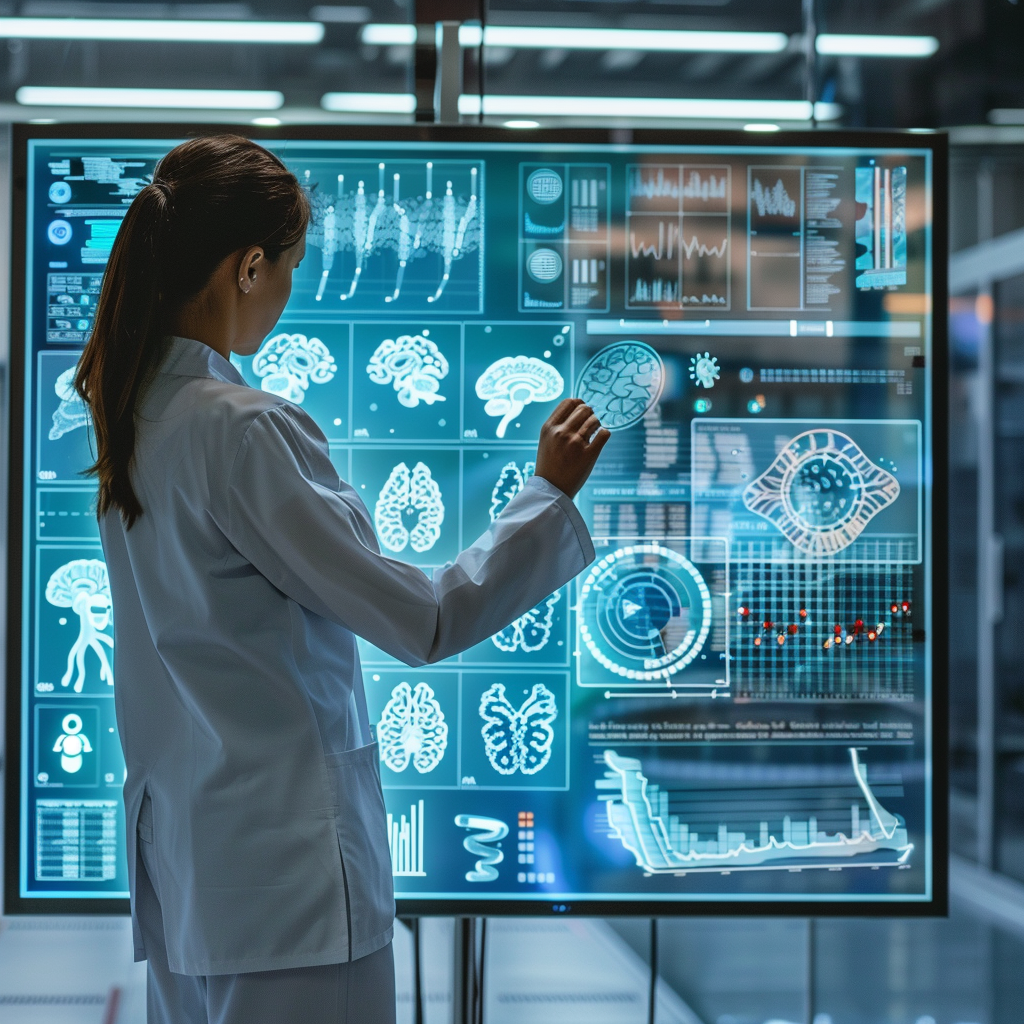

The advent of AI-enhanced blood tests marks a pivotal shift in the medical field, particularly concerning early diagnosis. Researchers from UCL and the University Medical Center Goettingen have pioneered a test capable of predicting Parkinson’s disease up to seven years before symptoms manifest. This early detection, driven by artificial intelligence in healthcare, facilitates timely interventions, potentially decelerating disease progression and significantly enhancing patient outcomes. The integration of AI in medical diagnostics exemplifies its powerful role in personalised medicine, providing targeted treatments based on specific patient data and clinical data. Healthcare professionals can leverage electronic health records to better understand patient history and improve treatment plans. The broader implications for healthcare are profound, with AI technologies poised to reshape disease management and preventative care, thus heralding an era of precision medicine and improved public health strategies.
The integration of AI-enhanced blood tests into personalised medicine signifies a remarkable advancement in the early diagnosis of Parkinson’s disease. AI in healthcare, driven by artificial intelligence and machine learning, allows for the accurate prediction of disease onset up to seven years before symptoms appear. This cutting-edge technology, spearheaded by researchers from UCL and the University Medical Center Goettingen, ensures timely and tailored interventions for patients. Medical professionals can leverage AI systems and healthcare data to develop personalised treatment plans, which not only improve management strategies but also highlight the potential for individualised care. Consequently, this innovative approach can slow disease progression, enhance patient quality of life, and reduce overall healthcare costs. As healthcare organisations adopt these technologies, the transformation of neurological disease treatment and beyond becomes evident, paving the way for advancements in drug discovery and overall medical practice.
AI’s influence extends far beyond the healthcare sector, offering transformative potential for a myriad of business operations. In the context of healthcare, AI systems can significantly enhance patient safety by analysing vast health data and identifying key patterns. For healthcare workers, AI can optimise various aspects of clinical practice, from predicting patient outcomes to streamlining routine tasks. Medical imaging is another area where AI excels, providing more accurate and faster diagnoses. Implementing AI within the healthcare system can improve decision-making processes through predictive analytics, allowing organisations to foresee health trends and patient behaviors with greater accuracy. Sustainable practices can also benefit, as AI technologies offer insights into efficient resource usage and waste reduction strategies. Ultimately, the integration of AI applications across all industries, including healthcare, can drive innovation and achieve long-term sustainability goals.
Harnessing the power of big data analysis has become crucial in optimising decisions and sustainability efforts across various sectors, including healthcare. By leveraging sophisticated AI systems, healthcare providers can process and analyse enormous datasets, such as electronic health records and clinical data, to unveil patterns and insights that were previously inaccessible. The use of deep learning and natural language processing in AI in healthcare facilitates informed decision-making, allowing healthcare providers to anticipate trends, understand patient behaviour, and tailor their strategies accordingly. Moreover, AI-driven big data analysis plays a pivotal role in clinical trials and accurate diagnoses by providing actionable insights into patient management and treatment outcomes. Through the intelligent application of big data, healthcare providers can streamline operations, improve efficiency, and adopt more sustainable practices, ultimately leading to enhanced competitive advantage and long-term success.
The burgeoning collaboration between academic institutions and industries has emerged as a powerful catalyst for technological advancements in medical diagnosis. By synergising the theoretical insights and innovative frameworks developed in academic settings with the practical expertise and resources of industry partners, these collaborations have successfully pushed the boundaries of what is possible in healthcare. A striking example of this dynamic is the partnership between UCL and the University Medical Center Goettingen, which has led to breakthrough AI systems capable of analysing health data and medical images for early Parkinson’s disease diagnosis. Such interdisciplinary cooperation not only accelerates the development of cutting-edge technologies but also ensures their practical application and scalability, ultimately improving patient care. Encouraging these partnerships is essential for fostering innovation in medical research, providing healthcare professionals with advanced tools, addressing complex global challenges, and maintaining a competitive edge in an increasingly technology-driven world.
The transition from mere prediction to proactive prevention in Parkinson’s disease is being realised through the implementation of AI-enhanced technologies. By harnessing the power of AI, researchers at UCL and the University Medical Center Goettingen have developed a blood test that can predict the onset of Parkinson’s disease up to seven years before symptomatic presentation. This remarkable innovation paves the way for early interventions, allowing for the timely initiation of tailored treatment strategies aimed at slowing disease progression. The early diagnosis facilitated by AI-driven tests enables healthcare providers to implement personalised treatment plans that address individual patient needs, thereby improving overall outcomes and quality of life. Additionally, this approach significantly reduces healthcare costs by potentially minimising the need for more intensive care later on. As AI continues to evolve, its role in transforming prediction into prevention holds immense promise for mitigating the impact of neurological diseases and enhancing patient care on a global scale.
As artificial intelligence continues to reshape the healthcare landscape, the opportunities for innovation and investment in new technologies are expanding at an unprecedented pace. By leveraging AI’s capability to analyse complex datasets and identify intricate patterns, researchers and healthcare providers have been able to develop groundbreaking diagnostic tools, such as the AI-enhanced blood tests for early Parkinson’s disease detection pioneered by UCL and the University Medical Center Goettingen. These advancements exemplify how AI can transform disease management by providing precise and personalised care. The investment potential in AI-driven healthcare technologies is immense, with possibilities ranging from advanced diagnostic systems to tailored treatment plans and predictive analytics. As AI technology continues to evolve and integrate into clinical settings, the collaboration between academic institutions, industries, and investors will be crucial in fostering continuous innovation. This synergy has the power to not only improve patient outcomes but also enhance the efficiency and sustainability of healthcare systems globally, making AI an indispensable tool for future medical advancements.
The advent of AI-enabled disease detection has revolutionised Parkinson’s research, marking a significant shift towards early diagnosis and preventive care. The collaborative efforts between UCL and the University Medical Center Goettingen have produced groundbreaking AI-enhanced blood tests capable of predicting Parkinson’s disease up to seven years before symptoms appear. This pioneering approach allows for earlier interventions, offering the possibility to slow disease progression and tailor treatment strategies to individual patients. By transforming prediction into actionable prevention, AI-driven diagnostics not only improve patient outcomes but also present a substantial opportunity for reducing long-term healthcare costs. The integration of artificial intelligence into Parkinson’s research exemplifies its potential to catalyse significant advancements in medical science, ultimately enhancing the quality of life for patients and making strides towards a future where diseases are managed with unprecedented precision.
The transformative potential of artificial intelligence is not confined to the healthcare sector alone; it extends robustly into business operations, driving efficiency, innovation, and competitive advantage. By leveraging AI technologies, companies can analyse vast amounts of data with unprecedented accuracy and speed, enabling real-time decision-making and optimising operational workflows. For instance, AI-powered predictive analytics can forecast market trends, enhance supply chain management, and improve customer engagement by personalising experiences based on behavioural insights. Furthermore, AI-driven automation reduces human error, cuts operational costs, and allows employees to focus on more strategic and creative tasks. The implementation of AI in business operations is essential for staying ahead of the curve in today’s rapidly evolving market landscape. As industries continue to adopt AI innovations, the collaboration between tech developers, academic researchers, and business leaders will be pivotal in unlocking new avenues for growth and maintaining a sustainable competitive edge.
This website uses cookies to improve your experience. Choose what you're happy with.
Required for the site to function and can't be switched off.
Help us improve the website. Turn on if you agree.
Used for ads and personalisation. Turn on if you agree.
This website uses cookies to improve your experience. Choose what you're happy with.
Required for the site to function and can't be switched off.
Help us improve the website. Turn on if you agree.
Used for ads and personalisation. Turn on if you agree.